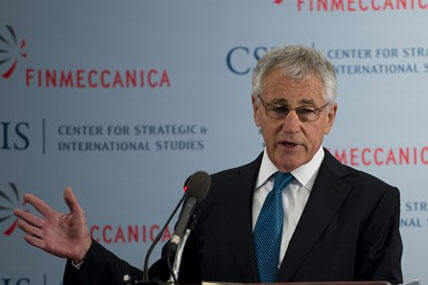Defense Secretary Chuck Hagel warned Tuesday that troops and their families will be asked to sacrifice on pay and benefits to preserve readiness in an era of tighter budgets.
Hagel listed politically-charged changes to compensation and personnel policy as one of his top six priorities in reforming the military following the wars in Iraq and Afghanistan as the department gears up to meet new challenges.
"This may be the most difficult" to achieve among his six priorities, Hagel said of proposals to trim pay increases, overhaul TRICARE and review retirement benefits while adapting to cuts in personnel.
"Without serious attempts to achieve significant savings in this area, which consumes roughly half of the DoD budget and is increasing every year, we risk becoming an unbalanced force," Hagel said.
The alternative was to have a military that is "well-compensated, but poorly trained and equipped, with limited readiness and capability," Hagel said in a keynote address to a Global Security Forum 2013 sponsored by the Center for Strategic and International Studies.
Hagel acknowledged the need to get approval for changes to compensation and personnel policy from members of Congress, who would be reluctant to justify military pay cuts to voters back home.
At a CSIS panel on defense budgets following Hagel's address, Jim Dyer, former staff director for the House Appropriations Committee, said he saw "no movement on pay, or to address TRICARE costs" in the current political environment.
"Congress is not there on this yet," Dyer said. "They're too determined not to hurt the troops," or their own chances for re-election, Dyer said.
In his 35-minute speech , Hagel said his strategic vision for the department's future constantly had to be balanced against the uncertainty of funding. The overall goal, given the political gridlock in Congress, involved a tradeoff on shrinking the size of the military to maintain investments in new weapons and cyberwarfare capabilities, Hagel said.
"Destructive technologies and weapons that were once the province of advanced militaries are being sought by non-state actors and other nations," Hagel said. "This will require our continued investment in cutting-edge defensive space and cyber technologies, and capabilities like missile defense, as well as offensive technologies and capabilities to deter aggressors and respond if we must.".
The degree of difficulty in the task increased exponentially under the budget cuts, Hagel said. The Defense Department is "currently facing sequester-level cuts on the order of $500 billion over 10 years. This is in addition to the ten-year, $487 billion reduction in DoD's budget that is already underway."
"These cuts are too fast, too much, too abrupt, and too irresponsible," Hagel said. "DoD took a $37 billion sequester cut during the past fiscal year, and we could be forced to absorb a $52 billion sequester cut this fiscal year."
Yet, Hagel said he remained committed to his six priorities "for our budget and strategic planning efforts going forward" -- institutional reform, force planning, readiness, investments in emerging capabilities, balancing capacity and capability, and balancing personnel responsibilities with a sustainable compensation policy.
Hagel also echoed the themes of former Defense Secretary Robert Gates and former Secretary of State Hillary Clinton, who reached a consensus on foreign policy that combined the soft power of diplomacy and development with the hard power of the military to achieve what they termed "smart power." Hagel said
"We will need to place more of an emphasis on civilian instruments of power," Hagel said.




























